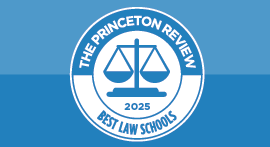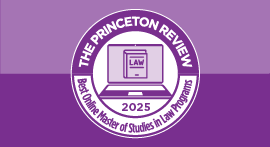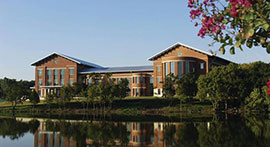From the School
St. Thomas University College of Law is a highly regarded student-centered law school where diversity is cherished, a commitment to human rights and international law flourishes, and the Catholic heritage of social justice enhances the education of all faiths.
LSAT
75th%: 155
50th%: 152
25th%: 150
GPA
75th%: 3.5
50th%: 3.3
25th%: 2.9
Who We Are
Average Age: 26
Gender Ratio: 52% Female
90 Different Universities
54 Different Majors
Overview
From The School
— Applying to St. Thomas Law
Application
Personal Statement (2-3 pages)
Resume
At least one Letter of Recommendation
LSAT Score and LSAT Writing Sample
Transcripts
LSAC Credentials Assembly Services Report
$40 Fee (waivers are available)
Test Scores
(enrolled students)
Deadlines
Application Process
Other Admission Factors
LSAT Score
Undergraduate GPA
Letters of Recommendation
Essay / Personal Statement
Selectivity Rating
Overall
From The School
Degrees Offered
Juris Doctor (J.D.):
— Joint Degrees
J.D./M.A. in Criminal Justice
J.D./M.B.A. in International Business
J.D./M.B.A. in Sports Administration
J.D./M.S. in Sports Administration
— Graduate Law Programs
LL.M. in Intercultural Human Rights
MLS in Cybersecurity Law & Policy
J.S.D. in Intercultural Human Rights
Programs and Curriculum
— J.D. Program: First-Year Courses
FALL:
Civil Procedure (4 credits)
Torts (4 credits)
Contracts (4 credits)
Legal Analysis, Writing and Research (3 credits)
Legal Skills (.5 credits)
SPRING:
Constitutional Law (4 credits)
Criminal Law (3 credits)
Property (4 credits)
Advanced Legal Research and Writing (3 credits)
Legal Skills (.5 credits)
— Certificate Programs
Admiralty and Maritime Law
Business Law
Criminal Litigation
Elder Law
Environmental Sustainability
Immigration Practice
Intellectual Property Law
Intercultural Human Rights
Real Estate Law
Tax Law
— Academic Success
Using an interactive and cooperative approach to learning, our unique academic success programs assist students in developing the requisite skills for success in both the study and the practice of law.
Our Academic Success Program offers:
Academic Advising
Academic Success Fellows
1L Workshops:
Bar Prep Courses
Bar Application & Conversion Assistance
Post-Graduation:
— Commercial Bar Prep
— Supplemental Bar Prep Workshops
— Bar Mentors
Faculty
Exceptionalism is the common thread that runs through St. Thomas Law's academics and the theme that guides the teaching styles of our professorial staff. As leaders in their fields, our faculty members have been called on to share their expertise and render opinions on issues of national and global relevance.
Our faculty have earned their law degrees and, in many cases, their advanced law degrees, from some of the nation's most prestigious institutions. Their record of publication of both textbooks and in leading law reviews is outstanding, and their practical experience is vast. But St. Thomas Law is more than academics. True to the core values held by our university, our faculty members guide national and local policy on human rights and the environment, lead national organizations, and offer assistance to the indigent.
A hallmark of the St. Thomas Law experience is the open-door policy maintained by faculty and administration alike. Faculty is readily accessible to students to clarify material from class, to offer guidance, or simply to discuss an interesting point of law. We invite you to learn more about our distinguished faculty and administration.
Special Programs
— Advanced Standing Program for Foreign Attorneys
As an institution that prides itself on the diversity of its student body, St. Thomas Law offers an accelerated law program for foreign attorneys. Foreign attorneys may complete their legal studies in an abridged program and receive a Juris Doctor degree after roughly two years (or 60 credits) of consecutive study at St. Thomas Law. St. Thomas Law may accept up to 30 credits as "advanced standing credits" from any student who engaged in legal studies at an academic institution in another country and obtained the terminal academic degree required for the student to practice law in said country. These credits are applied toward St. Thomas Law's 90 credit hour graduation requirement, thus shortening the Juris Doctor Program for Advanced Standing Students to approximately two years. Advanced Standing applicants do not need to take the LSAT but must score a 100 on the TOEFL IBT.
— On-Campus Clinics:
Appellate Litigation
Immigration
Tax
— Award-Winning Advocacy Teams:
Moot Court Board
Trial Team
— Internships:
Bankruptcy
Civil Practice
Criminal Practice
Elder Law
Florida Supreme Court
Judicial
United Nations in New York
Faculty Information
Students Say
Moreover, law students here speak glowingly about their “tremendously helpful and supportive” professors. The vast majority seems to maintain “an open door policy,” which really “allows students to visit professors freely to ask questions and review problems.” Additionally many truly appreciate how STU professors “push their students to achieve legal and social excellence.” Indeed, “they are always there to offer whatever they can to help students, which is always well researched or spoken from their extensive experience.” This praise also extends to the administration, which tends to “greet the students with open arms and typically by first name.” Impressively, they also operate under an open door policy, which “helps cater to the needs of students (ex: extending library hours during final exams).” As a second-year brags, “Anything the students want/need, the students feel free to bring up to the administration for their consideration.“
STU also provides “great” research facilities and on-campus resources. One second-year elaborates, “Not only do we have Westlaw and LexisNexis, we have access to other great databases such as JSTOR and HeinOnline. Campus offers unlimited, free printing which is helping when writing your law review comment and/or seminar paper.” Even better, “The staff in the library is ALWAYS around to help. They will meet with you for however long you need; it is like having your own personal library assistant there for you along the way.”
Students here are also extremely grateful for the professional opportunities a St. Thomas education affords them. As one second year elaborates, “The externship programs and on-campus interviews brought in from career services is phenomenal. The school places students in trial, appellate, and supreme courts for both state and federal systems.” Another pleased student agrees, “The reputation that our school has in South Miami has helped place these students in the judicial clerkships and various public offices (state attorney and public defenders).” Further, St. Thomas has “a unique relationship with the Pax Romana of the United Nations. Therefore, students can be selected to go to New York to the UN headquarters for a unique experience with ambassadors and diplomats.”
Career overview
From The School
— Career Development
The Office for Career Development offers a wide range of services including:
Individual Counseling:
One-on-one sessions to review resumes, conduct mock interviews, and strategize about career goals.
On-Campus Interview Program:
Twice a year, Career Development hosts law firms, government agencies, and public sector employees seeking to fill summer & permanent positions.
Lunch & Learns:
Weekly presentations by attorneys, business etiquette experts, judges, and career counselors. Provides phenomenal on-campus networking opportunities.
Breezeway Chatter Program:
Career Development counselors are available twice a month in the Breezeway to answer career-related questions.
St. Thomas Law Loan Repayment Assistance Program (LRAP):
LRAP encourages St. Thomas Law graduates to pursue public interest careers by providing loan repayment assistance.
— Alumni Relations
The Office for Career Development offers a wide range of services including:
Solo and Small Law Firm Practice Program:
The Office of Alumni Relations and Development sponsors the Solo and Small Law Firm Practice Program, which offers recent grads ongoing training and valuable networking experience to help build their professional careers as small firms or solo practitioners.
Alumni Networking Events and Reunions:
Throughout the year, the Office of Alumni Relations and Development coordinates various events to foster alumni engagement with their alma mater, including class reunions, geographical alumni reunions, and alumni happy hours.
Career Services
Graduates Employed by Area
Graduates Employed by Region
Prominent Alumni
Overview
From The School
2021-2022 Cost of Attendance
Tuition & Fees: $43,630
Room & Board: $17,600
Books & Supplies: $1,800
Loan Fees: $1,500
Transportation: $3,888
Personal & Misc. Expenses: $4,702
Financial Aid:
— St. Thomas Law Merit Scholarships:
Merit-based scholarships are automatically awarded by the Office of Admissions based on LSAT, academic record, service, and experience. All J.D. applicants are automatically considered for merit scholarships.
— Donor Scholarships:
St. Thomas Law offers a number of scholarships made available through the generosity of donors.
— Chapter 33 Yellow Ribbon:
St. Thomas University is proud to participate in the Yellow Ribbon program established by the Post 9/11 Veterans Education Assistance Act. Students who are eligible for Chapter 33 benefits at the 100% rate will receive up to $25,162.14 and up to an additional $10,000 in Yellow Ribbon match per academic year (August 1-July 31) in education benefits to cover tuition and fees.
— Segal AmeriCorps Education Award:
St. Thomas Law will match a student's Segal AmeriCorps Education Award (up to $5,550) per academic year for up to two years for students enrolled in the School's J.D. program.
— Federal Student Loan Program:
Federal Student Loans are available to eligible students. The two federal student loan programs available to law students are the Federal Direct Unsubsidized Loan & the Federal Direct Plus Loan for Graduate and Professional Students.
Dates
Financial Aid Statistics
Expenses per Academic Year
Overall
From The School
— Princeton Review Ranks ST. Thomas Law:
#1 Greatest Resources for Minority Students
#7 Greatest Resources for Women
#8 Most Diverse Faculty
— Student Organizations
American Bar Association/Law Student Division (ABA/LSD)
Asian American Law Student Association (AALSA)
Black Law Student Association (BLSA)
Business Law Society
Caribbean Law Students Association (CLSA)
Children and Family Law Society
Criminal Law Society
Cuban American Student Bar Association (CASBA)
Elder Law Society
Entertainment and Sports Law Society
Federal Bar Association Student Division (FBA)
Federalist Society
Florida Association for Women Lawyers (FAWL)
Florida Bar Young Lawyers Division
Hispanic American Law Student Association (HALSA)
Immigration Law Students Association (ILSA)
Intellectual Property and Cyber Law Society
International Law Society
Jewish Law Students Association
Lambda Law Society
Maritime Law Society
Peter T. Fay American Inn of Court
Judge Peter R. Palermo Mentorship Program
Phi Alpha Delta – Soia Mentschikoff Chapter (PAD)
Public Interest Law Society
Real Property, Probate & Trust Law Society
Space Law Society
St. Thomas More Catholic Law Society
Student Bar Association (SBA)
Tax Law Society
Tort Law Society
Veteran Students of America
Volunteer Income Tax Assistance (VITA)
— Student Publications
St. Thomas Law Review
Intercultural Human Rights Law Review
The St. Thomas Journal of Complex Litigation
Student Body Profile
Demographics
Campus Life
Students Say
STU is situated on the main campus of the larger university in a suburb between Fort Lauderdale and Miami. Some students tell us the location is “not so good.” The cost of living in these parts isn’t the cheapest, either. On the plus side, the weather in South Florida is “very relaxing” virtually year-round, and the Floridian campus boasts palm trees, ponds, and tennis courts. The area also offers tons of activities and nightlife. Bars, restaurants, shopping and cuisine are all world-class and, of course, “you always have the beaches.” Perhaps more importantly, students at STU are privy to “rich experiences” and “fantastic events.” A pleased third-year proudly shares, “Our Law Review [has] hosted a tremendous symposium on Media and the Law, in which Harvard Law Professor Charles Nesson was the keynote speaker.” Additionally, “[one] semester, Justice Scalia came and talked to our school.” St. Thomas Law hosts many alumni networking opportunities, affording students chances to network with the bench and bar. Socially, there are “enough student organizations to find something you like.” This law school is a pretty tight-knit place too. “Close relationships” are easily formed, and students know pretty much everyone in their class year. Also, “The school design invites socialization.” “There is a breezeway always full of students talking and hanging out, sharing thoughts, and talking about the professors and classes.”
More Information
Admissions Office Contact
From The School
Campus and Location
Student and faculty diversity, intimate classroom settings, a low student-to-faculty ratio, and a student-centered administration combine to form the uniquely friendly, collaborative environment at St. Thomas Law. The international city of Miami provides an exciting lifestyle and offers extensive employment, clerkship, and clinical opportunities.
Facilities
Assistant Dean for Enrollment & Scholarships
Miami , FL 33054



















